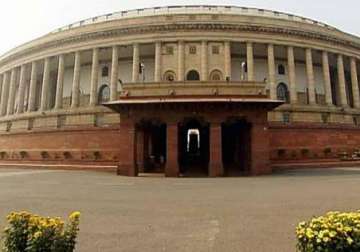'Special parliament session only after consensus on GST'
New Delhi:The Union government will convene a special session of parliament to pass the goods and services tax (GST) bill - a constitutional amendment - only after a consensus is achieved among all political parties,

New Delhi:The Union government will convene a special session of parliament to pass the goods and services tax (GST) bill - a constitutional amendment - only after a consensus is achieved among all political parties, including the Congress and the Left that are vociferously opposing the measure, official sources said.
The GST bill intends to create a harmonised system of taxation by subsuming all indirect taxes under one tax.
Government negotiators have reached out to Congress president Sonia Gandhi, vice president Rahul Gandhi and Leader of Opposition in Rajya Sabha Ghulam Nabi Azad, but the outcome is not encouraging as Rahul Gandhi is still adamant on not supporting the bill till the party's demands are met and changes accordingly made in the bill.
Finance Minister Arun Jaitley, Parliamentary Affairs Minister M. Venkaiah Naidu and Minister of State for Parliamentary Affairs Mukhtar Abbas Naqvi are talking to all political parties to reach a consensus on GST.
According to government sources, most of the parties are in favour of GST but the Congress and Left parties are still adamant on their stand. However, Samajwadi Party and the Trinamool Congress have conveyed to the government that they will support the bill only after a broader consensus on the issue.
The SP has 15 and TMC has 12 members in Rajya Sabha, where the Congress has 68 members and the NDA 63, including the BJP's 44. The government requires the support of at least 163 members of the 245-member house to pass a constitution amendment bill.
“There is a group in Congress party which is arrogant and whose imprudence on GST has created confusion. But we are still confident. In coming days, the bill will be passed,” Naqvi told IANS.
“Congress was also committed to GST and their only demand was that the bill be referred to a select committee which was met. The select committee has now submitted its report. The Congress should fulfill its commitment,” he added.
Despite the government's confidence, it has few options for passing the bill.
A constitution amendment bill can be introduced in either house of parliament and has to be passed by each house by a two-thirds majority of members present and voting.
“GST is a constitution amendment bill. There is no provision for bringing a constitutional amendment through an ordinance or a joint sitting of the house. It must be passed by both houses of parliament. There is no other way to pass a constitution amendment bill," constitution expert and former Lok Sabha secretary general Subhash Kashyap told IANS
To explore the possibility of passing the GST bill, the Cabinet Committee on Parliamentary Affairs had decided against immediate proroging of the houses when parliament's monsoon session was adjourned sine die Aug 13.
The sources said the decision to reconvene the monsoon session would depend on the progress the government makes in getting the support of opposition parties on the GST Bill in the Rajya Sabha.
The task before the government is to pass the bill in Rajya Sabha where it lacks majority.
The GST, Constitution (122nd Amendment) Bill, 2014 was introduced in Lok Sabha on December 19, 2014, which passed it on May 6, 2015. It was referred to a select committee of Rajya Sabha on May 14, 2015.
The bill was introduced in the upper house on the penultimate day of the monsoon session after the select committee of presented its report.
Since certain changess are expected in the bill that the Lok Sabha passed, the bill will have to be again passed by the lower house once it clears the Rajya Sabha.
Naqvi said that the government definitely lacked numbers in Rajya Sabha, but as far as the GST is concerned, the numbers are positively in its favour. The government is talking to all the stakeholders with a positive mindset so that the new tax regime can be rolled out from its current deadline of April 1, 2016, the current deadline, added Naqvi.
Once it clears parliament, the bill will have to be ratified by 17 state assemblies before it is sent to the president for his assent.
Naqvi also took a dig at Rahul Gandhi for Congress party's opposition to GST.
“Somebody's aggression should not stall the progress of the country. Trying to throw a spanner in the country's growth story is not aggression. It will boomerang on those people who are trying to stall the progress of the country,” Naqvi said, without naming Rahul Gandhi.
Parliament and state legislatures will have concurrent powers to make laws on GST but only the centre may levy an integrated GST (IGST) on the interstate supply of goods and services and imports.
(IANS)